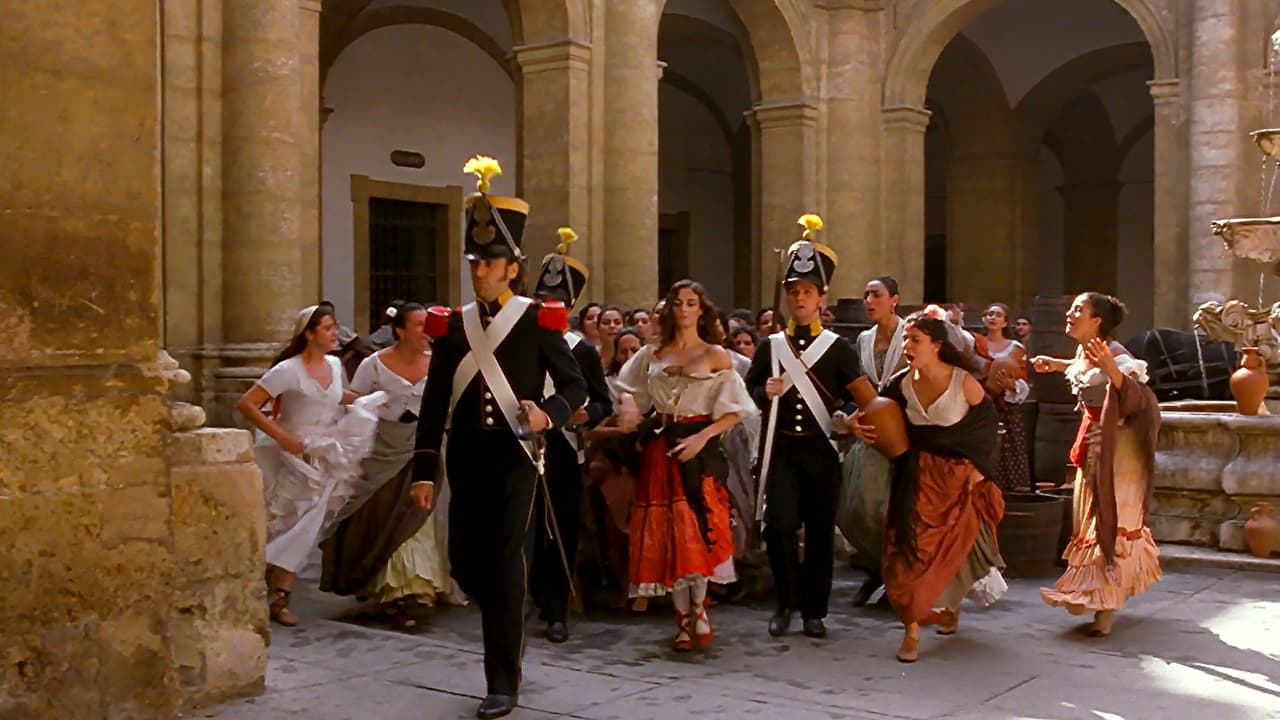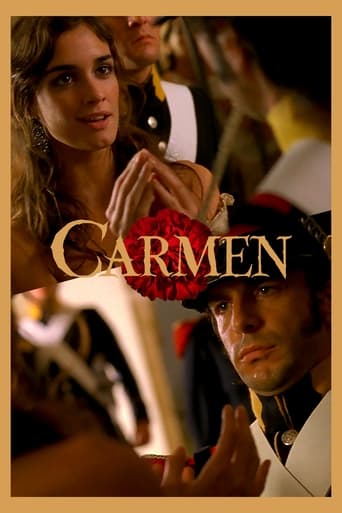

If you start thinking about the set up in which this film is inserted, you will want to see it. At least i did it: This is an adaptation of a novel, by a french writer (immortalized in an opera by a french composer). The writer, Mérimée, was as well an historian-archaeologist-translator; meaning this, someone who cared for "exotism", in a time in which Spanish or Portuguese rural worlds were still considered exotic to the English and the french. That novel established the clichés and preconceptions regarding Spanish culture still considered these days (and efficiently exploited by the tourism industry). Bizet also helped establish other clichés, musical to that matter. But this film is Spanish, in production, creative minds and people involved. So this was a brilliant opportunity for a view into a distinct edge of Spanish culture described by a french and commented on by the Spanish. That was the motivation for me.They started off quite well, and at least i think they gave a thought at what i mentioned. That's why they place Mérimée himself as a character, observing Andaluzia as a foreigner, and taking note of what he sees, even sharing space and scenes with Carmen and José. That was good, and i appreciated the audacity of crossing the line of the facts (if there ever was a real Carmen, Mérimée never got to know her).But the problem is, they never step out of the very clichés Mérimée established. The film is visually as lush as the opera is musically. The sets are brilliantly baroque, the (excellent) production emphasizes passioned environments (operatic, as well), an orange/yellow deviating sexual mood. But they also emphasize the temperament of the characters a little too much, deviating the thing from what could have been better explored, something that could matter and that is in fact noted:The drama is built around Carmen, and the inability for José to play the game according to her rules. Those rules are defined by cultural background, and that is where the frictions lie. Carmen comes from a branch of the Spanish culture, that transcends Spain. Gypsies, a group of nomads, a people that wouldn't, or couldn't adapt to the established norms the roman derived catholic based culture (that self and forced rejection still lasts today in most of the places). José is Basque, but that is little seen, he could be from Madrid, that in this case it would be the same, he is a cliché as well. So, it is those cultural differences that matter. This is, i mentioned, noted, but not made the center of the thing. They prefer remarking on the sensuality as the engine for the plot and sex as the motivation for the characters, that's why we have Paz Vega here, who had been in the brilliant sex-centered 'Lucía y el sexo' just 2 years before. Well she does deliver what they intended, and she is sensual for my contemporary and contextualized eyes. So it's not a matter of what they did here, but what they could have done.Side note: one could also take Carmen as an early symbol for a female emancipation that would only really happen decades later. Is this something Mérimée observed, or something he included as part of his french more cosmopolitan way of thinking?My opinion: 3/5http://www.7eyes.wordpress.com
... View MoreBefore launching into whether this film is worth your time or not, I should inform you I've never seen another adaptation of Carmen, so if you're looking for a review on how it ranks amongst others, this might not be of much use to you.The only time I've come across Carmen was on the car stereo when driving through Spain on a family holiday when I was a teenager. I didn't pay much attention to it because I didn't like opera at the time and I didn't know any better. The story has been around for 150 years or so. Do I feel I've missed out after seeing this movie? Yes, mainly due to the plot, but also because if all the actresses who played Carmen looked like Paz Vega, I would have all the adaptations happily sitting in my DVD collection.Directed by Vicente Aranda (who also co-rewrote the story with Joaquim Jordà), the story is told through the eyes of the original author Prosper Mérimée, a French writer making his way through 19th century Spain. He comes across José (Leonardo Sbaraglia), a delinquent soldier and one of many men who fall in love with Carmen (Paz Vega), a sultry, sexy, bedazzling gypsy woman, who has the mouth of the devil, the temper of a 'toro' and who recklessly leads men to their doom. The moment she meets José, she is attracted by his stand-offish behaviour. But she hooks him, reels him in and lets him go, many-a-time. Until one day, José is wanted for murder. Carmen persuades him to join her band of gypsy smugglers. They seem to be settling, she's fallen in love with him, but she meets the charming Escamillo, the bullfighter. Can José hold his jealousy in check, or does it destroy him? It's a beautiful,seductive story, something that resembles, almost, a Shakespearian or Ovid plot, with the portrayals of immense passion and emotion that can make or break us and transform us to do things out of character. It's poetic, fiery, and above all, slutty. I was left hanging on, I didn't know which way it was going to turn. I always hoped that José might change Carmen's dirty little ways. I won't tell you if he succeeded or not.The above synopsis is what I took away from the film, but I was not impressed by the film itself. It was only after I watched it that I dug a little deeper into the story and I realised how much of a missed opportunity Aranda had made of retelling Mérimée's classic. It was a shallow, slutty period-drama blunder, that saw Paz Vega spend a lot of the time partially or completely naked (not that I'm complaining about this in particular!).First of all, the acting was poor. I was not impressed by Sbaraglia as José. I'm still unsure whether he was a weak actor or José was supposed to be a weak character, I've not read the book. He's supposed to be a man who with burning desire for Carmen, but he spends much of the time looking confused, jealous and a bit dim. Paz Vega was slightly better as Carmen. I was convinced by her hardened, wicked character, although I have seen more convincing performances by her in other films, such as Zapping and Lucia y El Sexo. She seems too pretty to play a gypsy woman (not that I've come across many Andalusian gypsy women), so in a way, the role didn't really fit her. The other actors in the film weren't great either. They seemed to do everything half-heartedly. The story is passionate, emotive they looked half-arsed, as if they couldn't wait to get out the tight 19th century costumes they were wearing.However, the costumes, I was impressed with - one of the redeeming factors of the film. I like Spanish culture, I liked the soldiers' uniforms, the top-hats and the women's Flamenco dresses. They fitted the time well. That's all I can really say about that. Sorry, back to the criticism.The script, as stated above, was co-rewritten by Vicente Aranda and Joaquim Jordà, and done so badly, so much that it would leave Mérimée turning in his grave. It was boring. It didn't make best use of José's intense passion for Carmen (or maybe that was just the acting). There were cheesy lines piled upon one and other, Satan and devil connotations everywhere, amongst the millions of swear words. I know the Spanish are partial for the odd swear word, but the film was littered with puta, 'whore', in literally every line Maybe it was realistic in 19th century poverty-stricken Seville, but the story itself didn't need it.The editing and camera work was dull and ordinary. There was only one bit I actually liked, and that was when the camera follows a fly close-up in mid-air, which lands on Carmen's face. That was good. But the rest? Boring.To conclude, it is sad to see such a great story go to waste with unconvincing acting and directing. If you're a literature teacher, by all means let your class watch this adaptation to get an idea of the story. However, only the male half of the class will be paying any interest to the film, thanks to Paz Vega. Otherwise, stick to the opera version (even though I hate musicals). I give this film 4, just for the fact I love the storyline! And Paz Vega!
... View MoreThis movie has been promoting in everywhere in Spain with a huge publicity campaign, after watching it, you realise that someone has stolen your money. Paz Vega is horrible as Carmen, she´s not natural at all and she looks like she´s making a fashion magazine cover in all the shots ("the best" is when she as an andalusian woman ...¡can speak basque and fluently¡, Leonardo Sbaraglia is much better than her as Jose, but the story is very slow, the plot don´t work, and the screenplay is really very very bad...I think Penelope Cruz (the film was written for her)would have been a much more credible and sexy Carmen.What a waste of time and money
... View MoreExcellent movie in many aspects. Vicente Aranda has succeeded in depicting the time (1830) with meticulous care. The light, the places, the feeling, are perfectly perceived from the very start of the movie. And along with it -in opposite to what happened to "Mad Love" (Juana la Loca), a rather episodic historical movie- all of this beautiful photography/ music/ clothes is wrapping a very fluid screenplay that reaches its climax in the only possible way.Concerning the actors, Paz Vega as Carmen is outstanding: liar, seductive, agressive, totally sexual, so beautiful Carmen. Sbaraglia is a little less convincing the audience about his instant mad love for Carmen, but he succeeds in conveying the proper tragic mood to the whole movie. I recommend it to everyone: the best spanish movie of the year.
... View More